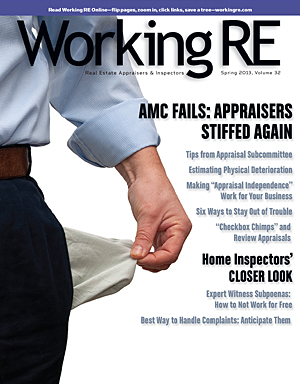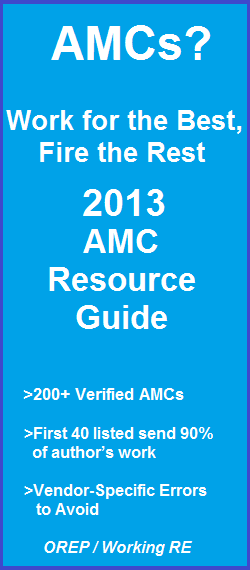
|
Published by OREP, E&O Insurance Experts | April 24, 2013 | Vol. 276 |
The ASC is a
depository of information reported by the various state boards, and although it
is rare, it is not without precedent to have inaccurate and potentially damaging
information reported there, according to Park.
Upcoming Webinar:
UAD Techniques: Avoiding the Hardstop
Editor’s Note:
Jim Park, Executive Director of the Appraisal Subcommittee, explains the reasons
for the delay in implementing the recently completed complaint hotline and
answers other questions important to appraisers
(excerpted from Working RE print).
Why you Should Check your Online Licensing
Information
by David Brauner, Editor
Jim Park, Executive Director of the Appraisal Subcommittee (ASC), has valuable
information for appraisers regarding their professional information posted
publically on the National Registry of Appraisers and more.
Last year, when Park spoke at the Valuation Expo in San Antonio, many appraisers
wondered why the “complaint hotline,” established under Dodd-Frank nearly three
years ago, was taking so long to become operational.
Dodd-Frank requires the ASC to create an appraisal complaint hotline for
consumers, lenders, appraisers, and any other entity to report violations of the
Uniform Standards of Professional Appraisal Practice (USPAP) or appraisal
independence.
Park told the gathering late last year that the ASC was “working diligently” to
establish the hotline and that there were several reasons for the delay. “It is
a complicated undertaking due to the coordination required between the ASC, the
member agencies and the states,” he said.
The sole purpose of the recently
implemented hotline is to refer USPAP and appraiser independence
complaints to the proper federal and state authorities for investigation. The individual agencies must then be prepared to appropriately address
the complaints each receives.
Check Your Records
Park advises that appraisers regularly review their records in the
National Appraiser Registry, located
at the ASC website (ASC.gov).
Disciplinary actions, license status- active or inactive, and more are
posted publically. The ASC is a
depository of information reported by the various state boards, and although it
is rare, it is not without precedent to have inaccurate and potentially damaging
information reported there, according to Park.
AMCs, lenders, insurance companies and others use the Registry to check the
status and records of appraisers before doing business with them.
Park also clarifies that the Registry is made up of appraiser
credentials and not individual
appraisers. Therefore, when you see registry numbers reported, it is important
to remember that they reflect the number of active credentials, not the number
of individual appraisers, as many appraisers have more than one credential.
Park also notes that the vast majority of appraisers who have exited the
profession in the last two years were at the “Licensed Appraiser” level.
Raising the Bar
Appraiser opinions are mixed regarding the recent, more extensive education and
training requirements for those entering the profession and wishing to advance. Some feel it enhances the profession to raise the bar, while others
caution it will exacerbate the looming “appraiser shortage.” Park indicates that
the Appraiser Qualifications Board is looking at various options including
working with colleges and universities to bring more young professionals into
the business.
Park also notes that the ASC has the authority, with approval of the
Federal Financial Institutions Examination Council,
to waive any requirement relating to certification or licensing of appraisers,
if it or any state agency determines that there is a scarcity of Certified or
Licensed appraisers- either in a state or in a particular location, which leads
to significant delays in the performance of appraisals.
Lack of Funding for States
Park also reminded the audience that the ASC is fully funded by appraiser fees,
which totaled just over $2.6 million in 2011, and not taxpayer dollars.
The ASC currently employs a staff of 12.
About the Author
David Brauner is Editor of
Working RE
magazine and Senior Broker at
OREP.org, a leading provider of E&O Insurance for appraisers,
inspectors and other real estate professionals in 49 states. He has covered the
appraisal profession for over 20 years. He can be contacted at
dbrauner@orep.org
or (888) 347-5273. Calif. Insurance Lic. #0C89873.
>
Click to Print
this Article
ATTENTION: You are receiving WRE Online News because you opted in at WorkingRE.com or purchased E&O insurance from OREP. WRE Online News Edition provides news-oriented content twice a month. The content for WRE Special Offer Editions is provided by paid sponsors. If you no longer wish to receive these emails from Working RE, please use the link found at the bottom of this newsletter to be removed from our mailing list.




